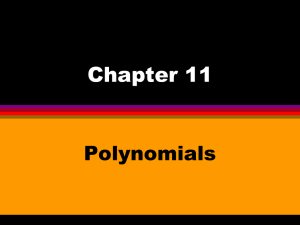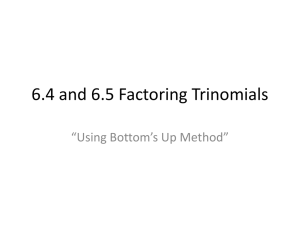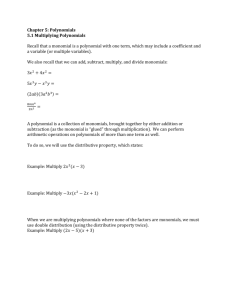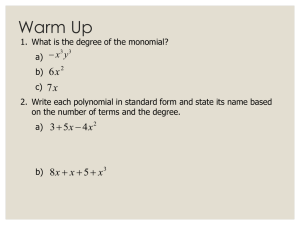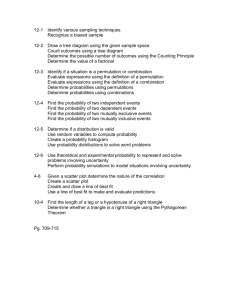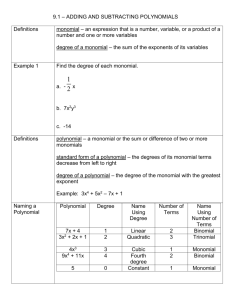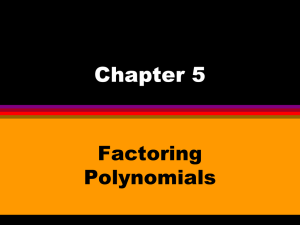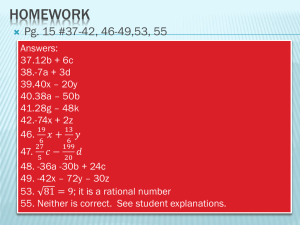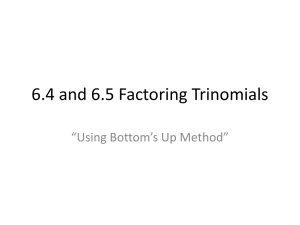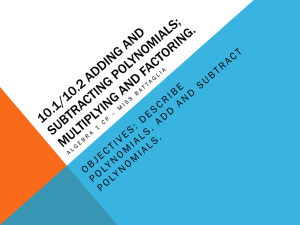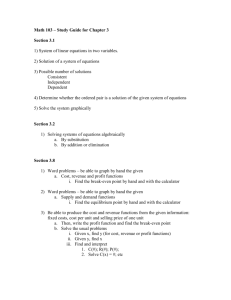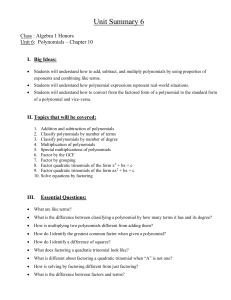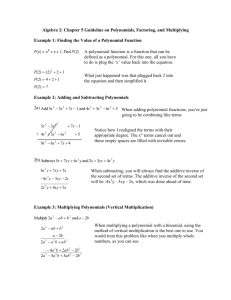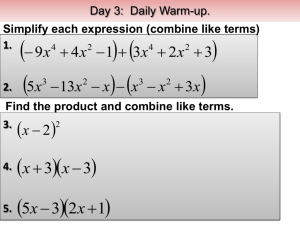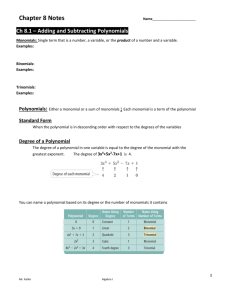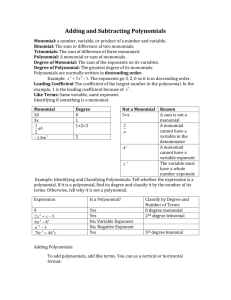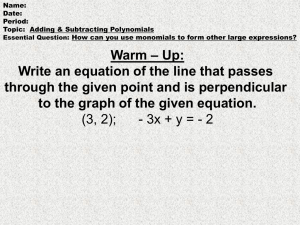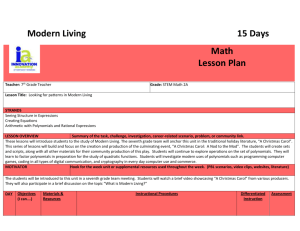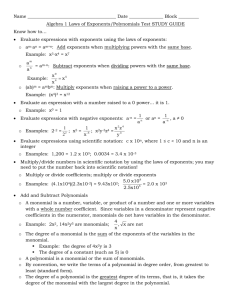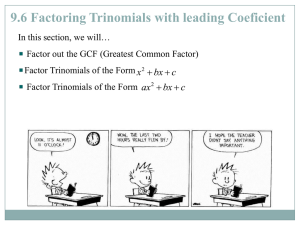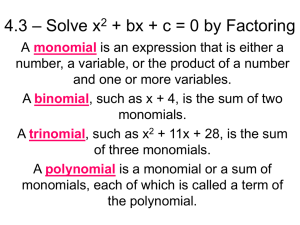Chapter 5
advertisement
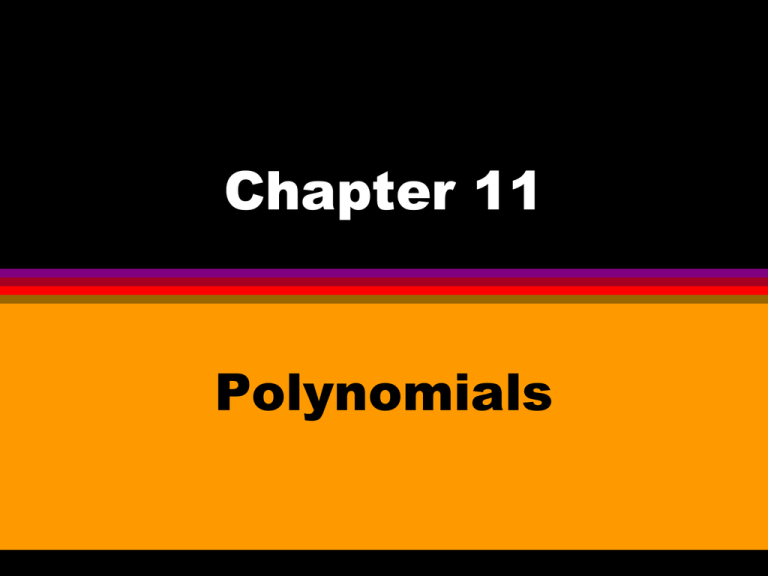
Chapter 11 Polynomials 11-1 Add & Subtract Polynomials Monomial A constant, a variable, or a product of a constant and one or more variables -7 5u 2 (1/3)m 2 3 -s t Binomial A polynomial that has two terms 2x + 3 3xy – 14 4x – 3y 613 + 39z Trinomial A polynomial that has three terms 2x2 – 3x + 1 14 + 32z – 3x mn – m2 + n2 Polynomial Expressions with several terms that follow patterns. 4x3 + 3x2 + 15x + 2 3b2 – 2b + 4 Coefficient The constant (or numerical) factor in a monomial 3m2 coefficient = 3 u coefficient = 1 -s2t3 coefficient = -1 Like Terms Terms that are identical or that differ only in their coefficients Are 2x and 2y similar? Are -3x2 and 2x2 similar? Examples 2 x + (-4)x + 5 2 x – 4x + 5 What are the terms? x2, -4x, and 5 Simplified Polynomial A polynomial in which no two terms are similar. The terms are usually arranged in order of decreasing degree of one of the variables Are they Simplified? 2 2x 2 x – 5 + 4x + 3x + 4x – 5 4x2 – x + 3x2 – 5 + x2 11-2 Multiply by a Monomial Examples (5a)(-3b) 2 2 3v (v + v + 1) 12(a2 + 3ab2 – 3b3 – 10) 11-3 Divide and Find Factors GREATEST COMMON FACTOR The greatest integer that is a factor of all the given integers. 2,3,5,7,11,13,17,19,23,29 Prime number - is an integer greater than 1 that has no positive integral factor other than itself and 1. GREATEST COMMON FACTOR Find the GCF of 25 and 100 25 = 5 x 5 100 = 2 x 2 x 5 x 5 GCF = 5 x 5 = 25 GREATEST COMMON FACTOR Find the GCF of 12 and 36 12 = 36 = GCF = GREATEST COMMON FACTOR Find the GCF of 14,49 and 56 14 = 49 = 56 = GCF = Factoring Polynomials vw + wx = w(v + x) Factoring Polynomials 2 21x = – 2 35y Factoring Polynomials 13e – 39ef = Dividing Polynomials by Monomials 5m + 35 5 = 5(m+ 7)÷5 = m+7 Dividing Polynomials by Monomials 7x + 14 7 = 7x + 14 7 7 = x+2 Dividing Polynomials by Monomials 6a + 8b 2 = 2(a +4b) ÷ 2 = a + 2b Dividing Polynomials by Monomials 2 6x 2x + 2x 11-4 Multiply Two Binomials Multiplying Binomials When multiplying two binomials both terms of each binomial must be multiplied by the other two terms Multiplying binomials Using the F.O.I.L method helps you remember the steps when multiplying F.O.I.L. Method F – multiply First terms O – multiply Outer terms I – multiply Inner terms L – multiply Last terms Add all terms to get product Example: (2a – b)(3a + 5b) F – 2a · 3a O – 2a · 5b I – (-b) ▪ 3a L - (-b) ▪ 5b Example: (x + 6)(x +4) F –x▪x O – x ▪ 4 I – 6 ▪ x L – 6 ▪ 4 11-5 Find Binomial Factors in a Polynomial Procedure Group the terms in the polynomial as pairs that share a common monomial factor • Extract the monomial factor from each pair • Procedure • • If the binomials that remain for each pair are identical, write this as a binomial factor of the whole expression The monomials you extracted create a second polynomial. This is the paired factor for the original expression Example 4x3 + 4x2y2 + xy + y3 Group (4x3 + 4x2y2) and factor Group (xy + y3) and factor 4x2(x +y2) + y(x + y2) Answer: (x +y2) (4x2 + y) Example 2x3 - 2x2y - 3xy2 + 3y3+ xz2 – yz2 Group (2x3 - 2x2y2 ) and factor Group (- 3xy2 + 3y3) and factor Group (xz2 – yz2) and factor Answer: 11-6 Special Factoring Patterns 11-6 Difference of Squares (a + b)(a – b)= 2 a (x + 5) (x – 5) = - 2 x 2 b - 25 11-6 Squares of Binomials (a + 2 b) = 2 a + 2ab + 2 b (a - b)2 = a2 - 2ab + b2 • Also known as Perfect square trinomials Examples (x + (y - 2 3) 2 2) =? =? (s + 6)2 = ? 11-7 Factor Trinomials Factoring Pattern for x2 + bx + c, c positive x2 + 8x + 15 = (x + 3) (x + 5) Middle term is the sum of 3 and 5 Last term is the product of 3 and 5 Example y2 + 14y + 40 = (y + 10) (y + 4) Middle term is the sum of 10 and 4 Last term is the product of 10 and 4 Example y2 – 11y + 18 = (y - 2) (y - 9) Middle term is the sum of -2 and -9 Last term is the product of -2 and -9 Factoring Pattern for x2 + bx + c, c negative x2 - x - 20 = (x + 4) (x - 5) Middle term is the sum of 4 and -5 Last term is the product of 4 and - 5 Example y2 + 6y - 40 = (y + 10) (y - 4) Middle term is the sum of 10 and -4 Last term is the product of 10 and - 4 Example y2 – 7y - 18 = (y + 2) (y - 9) Middle term is the sum of 2 and -9 Last term is the product of 2 and -9 11-9 More on Factoring Trinomials 11-9 Factoring Pattern for ax2 + bx + c Multiply a(c) = ac • List the factors of ac • Identify the factors that add to b • Rewrite problem and factor by grouping • Example 2 2x + 7x – 9 List factors: (-2)(9) = -18 Factors: (-2)(9) add to 7 (2x2 -2x) + (9x – 9) 2x(x -1) + 9(x – 1) (x-1)(2x +9) Example 2 14x - 17x + 5 List factors: (14)(5) = 70 Factors: (-7)(-10) add to -17 14x2 -7x – 10x + 5 2 (14x – 7x) + (-10x +5) 7x(2x-1)- 5(2x -1) (7x -5)(2x – 1) Example 2 3x - 11x - 4 List factors: (-12)(1) = -12 Factors: (-12)(1) add to -11 3x2 -12x + 1x - 4 2 (3x – 12x) + (1x -4) 3x(x-4) + 1(1x -4) (x -4)(3x + 1) END END END END END
